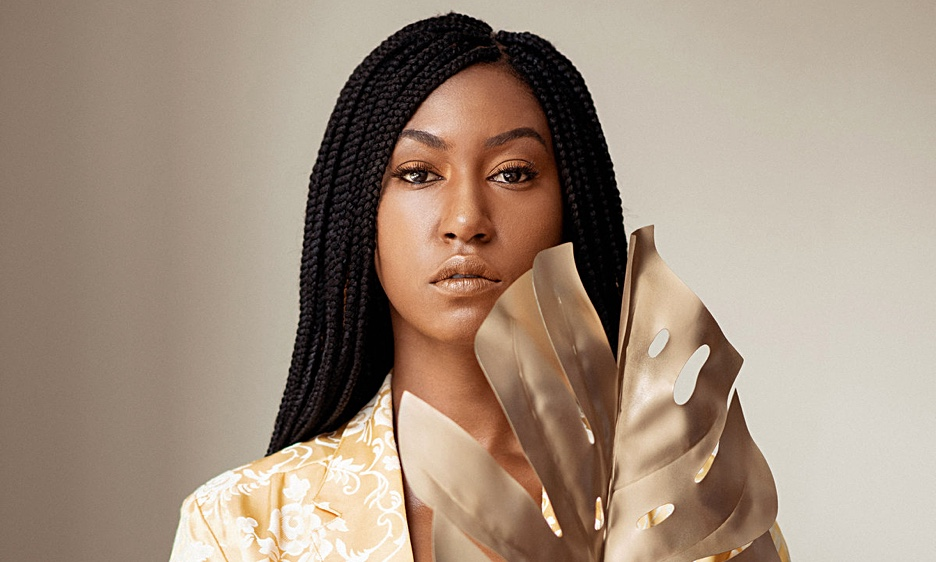Home » Jazz Articles » Interview » Dominique Fils-Aimé: The Power of Change
Dominique Fils-Aimé: The Power of Change

Courtesy Andreanne Gauthier
Hitting the right note is not about the sound, it is about the emotion we put in it.
All About Jazz: Three Little Words completes the trilogy dedicated to African-American music that includes Nameless and Stay Tuned! . Tell us about the evolution of this trilogy.
Dominique Fils-Aimé: I started this trilogy when I realized how history cannot be reduced to the facts, times and events which we can read about in history books, but includes also the emotions captured by the artists that experienced those times and events.
In conceiving this trilogy I decided to build a correlation between the primary colors that characterize the album covers and the elements and moments of the day to facilitate the understanding of the perspective I am suggesting. The color blue of Nameless is connected to blues music and to songs of those enslaved. It symbolizes the crossing the waters of a dark ocean in the middle of the night, the arrival to the Americas, the loss of identity and humanity. The dark side of humanity. The red of Stay Tuned! is linked to jazz in its purest definition, free creation and the challenging of the status quo. It recalls the fire element, the burning anger and passion that lived in the heart of both artists and activists who set the civil rights movement in action. It is the dawn of a new day. That fire is like lava that brings everything down, but also leaves a more fertile ground to feed everyone. Finally, the sunny yellow of Three Little Words reflects soul music primarily, but also all the ramifications that came out of the jazz era. After a few freedoms found, we are finally able to celebrate the small victories, unite, heal. If jazz was the trunk of a tree, the branches and leaves are soul, R&B, neo-soul, Motown, doo-wop and so many other ramifications. The sun warms our hearts, the lemon tree is filled with lemons, ready to be turned into sweet lemonade. The wind of change is comforting us.
AAJ: You announced that the trilogy would "end in revolution." Did that happen?
DFA: I do believe we are now in a time of revolution and change. The system is being shaken to its core because we have remembered that we are the ones who get to choose. We are part of this system and therefore hold the true power to change it. I see many people uniting and imposing change in their respective fields, on the micro and macro levels. Also, on a personal level, this trilogy was a true revolution. It taught me the importance of doing what we feel is right and standing by what we want. Looking at the past shaped a new vision of the future for me.
AAJ: The single "While We Wait" contains a clear manifesto in this regard. There is a shift in tone towards the end and you sing "We could be the change/ we can see the chains/ we will be the change." What is the change you're hoping for?
DFA: The change that I am hoping for, and that I am already seeing happen, is a world where we all work together to make our societies mentally and physically healthy for all. Societies that could be a safe space for everyone.
AAJ: What are those "Three little words" and what is your message?
DFA: I'm pretty sure most people will guess those three little words are "I love you." The fact that people can guess without me having to say it is very telling. This is how important and powerful these words are. Three little words can also be a wink at the fact that the title of each track of the album contains three words. Last, but not least, those three little words for me are "Celebrating Small Victories"!
AAJ: I listened to your latest album from beginning to end and then from end to beginning. It has been like taking a round trip, through different cultures, countries and styles (from North America, even going towards the East) and then bringing them back home. From where did you draw your inspiration for this album and how did you weave all these influences together?
DFA: Compared to my first two records, this album is closer to modern times so I needed to dig into my current influences. In a way, these influences are the result of globalization and its impact on our access to music from all around the world. I have always been drawn to music from everywhere, they all make me feel connected to a different part of me. Souls are universal, just like soul music.
AAJ: Each album cover of this trilogy features a head-shot of you. Looking at these three covers in chronological order you progressively turn towards the listener, finally making "eye contact" with the listener on Three Little Words. Was that deliberate and what was the concept behind it?
DFA: The evolution across the three covers is like the phases of the moon progressively uncovering. Since Nameless is related to a loss of identity, there is no eye contact, half the face hidden, so no way to truly identify my face. Stay Tuned! embodies a desire to confront preestablished rules in a defiant way, so the head shots does not show me fully frontal yet, but there is eye contact because there is a message that is being delivered. On the cover of the last album I am fully frontal because it is the album that steps into my era, the influences that have been alive during my time. I am speaking from a more personal vantage point.
AAJ: Nina Simone, Billie Holiday, Etta James are key inspirations for you. Three women who are committed, powerful, but also fragile and tormented. What drew you to them?
DFA: I find that the honesty and vulnerability they shared with us is their biggest proof of courage. They sang from their hearts and this is what I aspire to do. To me, being raw and real is the most important thing in music. Hitting the right note is not about the sound, it is about the emotion we put in it.
AAJ: What does it mean to be socio-politically engaged as a musician today?
DFA: I feel like I am just a soul trying to connect with other souls in the hope that we can continue building a better, more accepting, and inclusive world together.
AAJ: What is your mission?
DFA: To leave traces of love.
AAJ: In your latest album you communicate an idea of hope, you talk about healing ("The Healing Song"), love and resistance ("Love Take Over" or "We Are Light") as if the music had a therapeutic function. What do you think about the healing power of music?
DFA: Music has always been my therapist. I believe we underestimate the power of music. The wave frequencies that go through us, filled with the intention the artist put in them, have the power to reach our deepest and most intimate fears and pain. Certain emotions may be taboo to many, but music does not judge no one. In a world that says "good vibes only" music welcomes us no matter what state of mind we're in.
AAJ: In the trilogy your voice is front and center. You shifted from the minimalist set-up of your first record, in which you focused on your vocal possibilities, to the more complex arrangements of the later albums in which contemporary jazz opens to other languages. What took you down this path?
DFA: Just like the covers of the album were uncovering more and more of me, my vocal presence increases record after record. It's a path that goes from the idea of feeling voiceless in darker times all the way to finding our voice and using it to its full extent.
AAJ: What are your next projects and plans?
DFA: Napping, expressing my gratitude, re-centering myself, listening to my heart to see what message it wishes to share next.
AAJ: Shifting from the future to the past, when was your passion for music born?
DFA: I always recall loving music, dancing, singing. The deeper emotional connection with music formed in my teenage years. I would borrow albums from my sister and when I found one I liked I would listen to it on repeat until late at night; feeling so connected and overwhelmed by the emotions these songs or artists were giving me. I fell in love with that sensation.
AAJ: Why did you decide or choose to sing?
DFA: I tried other jobs, looking for a way to contribute to this world in any way possible. When I started working in psychological support for employees in corporations I had to make music on the side to heal myself from the traumatic state the job was putting me in. Eventually, I realized music was the best way for me to contribute while keeping myself happy and healthy. That was about six years ago.
AAJ: If you had to describe yourself, how would you define Dominique Fils-Aimé?
DFA: A soul attached to a body, both doing their best to share love and light using music and everyday life interactions.
< Previous
Este Ritmo
Next >
Secret Suite
Comments
About Dominique Fils-Aimé
Instrument: Vocals
Related Articles | Concerts | Albums | Photos | Similar ToTags
For the Love of Jazz
 All About Jazz has been a pillar of jazz since 1995, championing it as an art form and, more importantly, supporting the musicians who create it. Our enduring commitment has made "AAJ" one of the most culturally important websites of its kind, read by hundreds of thousands of fans, musicians and industry figures every month.
All About Jazz has been a pillar of jazz since 1995, championing it as an art form and, more importantly, supporting the musicians who create it. Our enduring commitment has made "AAJ" one of the most culturally important websites of its kind, read by hundreds of thousands of fans, musicians and industry figures every month.






















